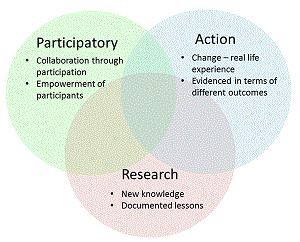Participatory action research provides for multiple benefits

Over recent years we have begun to see the increased use of collaborative and multi-stakeholder processes in a range of sustainability, natural resource and environmental management areas and sectors. Participatory Action Research is emerging as a useful approach to improving the way we learn about and improve the way we manage these processes. This blog provides a brief introduction to action research and how it is can be used, and points to a range of resources that provide more specific information around its use in practice.
Participatory Action Research (PAR) is one of a family of research methodologies (action research, action learning, etc.) which aim to pursue action and research outcomes at the same time. With this emphasis on actively supporting action it differs from more mainstream research methodologies which place more importance on looking in from outside an intervention as a means to understand social and organizational arrangements. In action research the focus is action to improve a situation, and the research is the conscious effort, as part of the process, to develop public knowledge that adds to theories of action that inform similar collaborative processes. In summary, PAR encourages a simultaneous focus on four basic themes:
- collaboration through participation
- development of knowledge
- social change
- empowerment of participants
The process that the researcher uses to guide those involved can be seen as iterative learning cycles consisting of phases of planning, acting, observing and reflecting. Fundamental, then, to action research is the concept of “learning by doing”. It recognizes that people learn through the active adaptation of their existing knowledge in response to their experiences with other people and their environment – social learning.
The underlying assumption of this approach is that effective social change depends on the commitment and understanding of those involved in the change process. In other words, if people work together on a common problem clarifying and negotiating ideas and concerns, they will be more likely to change their minds if their joint inquiry indicates such change is necessary. Also, it is suggested that this collaboration can provide people with the time and support necessary to make fundamental changes in their practice which endure beyond the research process.
Against this background, the role of the action researcher is similar to many contemporary practitioners aiming to work in a facilitatory manner to help people in communities and organizations to identify and adopt more sustainable natural resource management practices. These practitioners may come from key stakeholder groups, or they may be research or agency staff. However, their most effective role will be to work with a group, often with multiple interests and perspectives, to develop participatory attitudes, excitement and the desire to work together on jointly negotiated courses of action to bring about improvements and innovation for individual and community benefit. While this role is similar to much of consultancy, action research provides a means by which is more rigorous, and which allows for the development of public knowledge to advance the field.
An action research approach looks to build on good reflective practice. Through their observations and communications in the collaborative process at hand reflective practitioners are continually making informal assessments and judgments about the best way to engage. The difference between this and carrying out these activities as part of an action research inquiry is that during the action research process these practitioners will need to develop and use a range of skills to achieve better evaluation and critical reflection. These skills include things such as more detailed planning, more conscious observation, active listening, improved attention to evaluation and critical reflection. A good understanding of social and behavior change theory is also important.
More resources can be found from the main LfS participatory action research page. More links to related material can also be found from the LfS Theory of Change page, and the Social Learning and the Planning, Monitoring and Evaluation sections.
An independent systems scientist, action research practitioner and evaluator, with 30 years of experience in sustainable development and natural resource management. He is particularly interested in the development of planning, monitoring and evaluation tools that are outcome focused, and contribute towards efforts that foster social learning, sustainable development and adaptive management.

This is a good document as when many stakeholders are in any activity are involved, a variety of ideas do emerge and agreed upon. In such a situation, no stakeholder feels side-lined in the process.
I’ve participated in planning groups or observed them and noted that because the planning process itself was not used as an opportunity to communicate collaboratively with members of the group the strategies were weak.Though the outcomes may appear to be successful that isn’t always the case because the strategies don’t have opportunity to be internalized, weighed and adopted by all of the participants, especially by those directly impacted or those that are tasked with carrying out the strategies. With intentional participatory action all involved can have actionable roles that are self defined and valued as part of larger sustainable systems.
Really helpful.
I have loved the philosophy and assumption of this qualitative research approach. I have never used before but I will give a try in my next study. however, I want to know aside it assumption, how is it different from case study design with vivid reasons and examples?